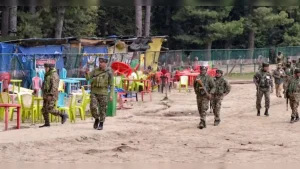Jammu & Kashmir – The performance of a Janaza Ghaib ceremony in Pakistan-occupied Kashmir has provided definitive evidence of Islamabad’s involvement in the devastating Pahalgam terror attack that claimed 26 civilian lives on April 22. This funeral in absentia, conducted for terrorist Tahir Habib who was killed during Operation Mahadev in Jammu and Kashmir, represents a significant intelligence breakthrough confirming Pakistan’s state-sponsored terrorism activities.
The Janaza Ghaib ceremony held in Rawalkote village demonstrates the direct connection between Pakistani territory and the terrorists who perpetrated the Pahalgam massacre. This religious ritual, performed when the deceased’s body is unavailable, indicates the terrorist’s Pakistani origins and the network’s cross-border operational structure.
Operation Mahadev Success and Terrorist Elimination

Tahir Habib, the subject of the Janaza Ghaib ceremony, was classified as an ‘A’ category terrorist whose elimination during Operation Mahadev in Srinagar represented a major breakthrough for Indian security forces. His killing, along with two other terrorists last week, significantly disrupted terrorist operations in the region.
The terrorist for whom the Janaza Ghaib was performed had been a high-priority target for Indian intelligence agencies. His neutralization during Operation Mahadev demonstrated the effectiveness of precision counter-terrorism operations in dismantling terror networks operating across the Line of Control.
The timing of the Janaza Ghaib ceremony, following Tahir’s elimination in Operation Mahadev, confirms the immediate impact of Indian counter-terrorism efforts on Pakistani terror networks. This funeral ritual provides tangible evidence of operational success against cross-border terrorism infrastructure.
LeT Commander’s Forced Participation


Videos and photographs from the Janaza Ghaib ceremony revealed the attendance of local Lashkar-e-Taiba commander Rizwan Hanif, despite explicit objections from Tahir’s family. The family had specifically barred LeT members from attending the funeral, highlighting growing resistance to terrorist organizations even within affected communities.
The forced participation in the Janaza Ghaib ceremony, where Hanif threatened mourners with a gun to ensure his attendance, demonstrates the coercive methods employed by terrorist organizations to maintain control over local populations. This intimidation tactic backfired, generating significant outrage among village residents.
The confrontational nature of the Janaza Ghaib ceremony has sparked unprecedented community resistance, with villagers now planning a public boycott to oppose terror recruitment activities. This grassroots opposition represents a significant shift in local sentiment against Pakistani terror infrastructure.
Community Resistance and Terror Recruitment Opposition
The aftermath of the Janaza Ghaib ceremony has catalyzed remarkable community resistance in Rawalkote village, where residents are organizing systematic opposition to terrorist recruitment efforts. This spontaneous movement demonstrates growing awareness of terrorism’s devastating impact on local communities and families.
The village boycott initiative following the Janaza Ghaib incident represents a crucial development in counter-terrorism efforts, as local communities begin actively resisting Pakistani state-sponsored terror machinery. This grassroots opposition could significantly impact future recruitment activities in the region.
The community’s reaction to the forced Janaza Ghaib participation illustrates how terrorist organizations’ heavy-handed tactics often generate counterproductive results, alienating the very populations they seek to control and recruit from for their operations.
Terrorist Background and Organizational Affiliations
Prior to his death and subsequent Janaza Ghaib ceremony, Tahir Habib had extensive connections with various extremist organizations. His early associations included the Islami Jamiat Talaba and the Student Liberation Front before his eventual recruitment into the Pakistan army, demonstrating the systematic pathway from student radicalization to military terrorism.
The terrorist honored through the Janaza Ghaib belonged to the Sadozai Pathan community, which migrated from Afghanistan in the 18th century. This historical connection earned him the alias ‘Afghani’ in intelligence records, reflecting his ethnic and geographical origins.
Tahir’s community had previously played significant roles in the Poonch Rebellion, providing historical context for his recruitment into terrorist activities. The Janaza Ghaib ceremony thus honored not just an individual terrorist but a representative of systematic recruitment from specific ethnic communities.
Operation Sindoor Impact and Cross-Border Effects


The Janaza Ghaib ceremony occurred against the backdrop of Operation Sindoor, India’s precision strike response that neutralized over 100 terrorists in retaliation for the Pahalgam attack. This massive counter-terrorism operation targeted terror launchpads deep inside Pakistani territory on May 7.
The community resistance emerging after the Janaza Ghaib incident suggests that Operation Sindoor’s impact extends beyond immediate tactical success to influencing local sentiment against terrorism. The precision strikes appear to have created psychological pressure on terror networks and their support systems.
The villagers’ boycott initiative following the Janaza Ghaib ceremony demonstrates that Operation Sindoor’s effects are being felt across the border, potentially disrupting recruitment activities and community support for terrorist organizations.
Intelligence Significance and Strategic Implications


The Janaza Ghaib ceremony provides crucial intelligence confirmation of the direct Pakistani connection to the Pahalgam terror attack. This evidence strengthens India’s diplomatic position regarding Pakistan’s role in sponsoring cross-border terrorism and supporting international terrorist networks.
The forced nature of LeT participation in the Janaza Ghaib ceremony reveals internal tensions within terror networks and growing community resistance to their activities. This intelligence represents valuable insight into evolving dynamics within Pakistani terror infrastructure.
Future Counter-Terrorism Implications
The community resistance sparked by the Janaza Ghaib incident suggests potential opportunities for expanding counter-terrorism efforts through local engagement and support for grassroots opposition to terrorist recruitment. This organic resistance movement could prove more effective than external interventions in reducing terrorism.
The successful elimination of high-value targets like Tahir, whose Janaza Ghaib ceremony revealed extensive Pakistani connections, demonstrates the importance of continued precision operations against terror leadership and infrastructure across the Line of Control.

